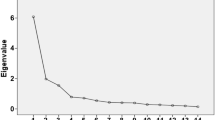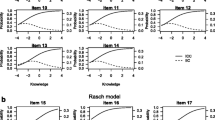ABSTRACT
BACKGROUND
In 2005 the Spoken Knowledge in Low Literacy in Diabetes scale (SKILLD) was introduced as a diabetes knowledge test. The SKILLD has not been validated since its introduction.
OBJECTIVE
To perform a validation analysis on the SKILLD.
DESIGN AND PARTICIPANTS
Cross-sectional observational study of 240 patients with diabetes at an academic family practice center.
MAIN MEASURES
SKILLD’s correlation with an oral form of the Diabetes Knowledge Test (DKT) was used to assess criterion validity. A regression model tested construct validity, hypothesizing that SKILLD score was independently related to health literacy and education level. Content validity was tested using Cronbach’s Alpha for inter-item relatedness and by comparing SKILLD items with the content of a National Institutes of Health (NIH) diabetes education website. We assessed inter-rater reliability and bias using Spearman correlation coefficients and sign-rank tests between interviewers scoring the same interview.
KEY RESULTS
The SKILLD demonstrated fair correlation with the DKT (Pearson’s coefficient 0.54, 95% CI = 0.49 to 0.66, p < 0.001). Health literacy, education level, male gender, household income, and years with diabetes were independent predictors of SKILLD score in the regression model. Cronbach’s Alpha for inter-item relatedness was 0.54. There were some topics on the NIH website not addressed by the SKILLD. The inter-rater correlation coefficient was 0.79 (95% CI 0.56 to 0.91, p < 0.001).
CONCLUSIONS
The SKILLD is an adequate diabetes knowledge test and is appropriate for people of all literacy levels. However, it should be expanded to more completely evaluate diabetes knowledge.

Similar content being viewed by others
References
National Institute of Diabetes and Digestive and Kidney Diseases. National Diabetes Statistics fact sheet: General information and national estimates of diabetes in the United States, 2005. Bethesda, MD: U.S. Department of Health and Human Services, National Institute of Health; 2005.
McKinlay J, Marceau L. US public health and the 21st century: diabetes mellitus. Lancet. 2000;356:757–61.
Standards of medical care in diabetes--2009. Diabetes Care 2009;32 Suppl 1:S13-61.
Saaddine J, Cadwell B, Gregg E, et al. Improvements in diabetes processes of care and intermediate outcomes: United States, 1988–2002. Ann Intern Med. 2006;144(7):465–74.
Moffet HH, Parker MM, Sarkar U, et al. Adherence to laboratory test requests by patients with diabetes: the diabetes study of northern California (DISTANCE). Am J Manag Care. 2011;17(5):339–344.
Bodenheimer T, Wagner EH, Grumbach K. Improving primary care for patients with chronic illness: the chronic care model, Part 2. JAMA. 2002;288:1909–14.
Brown SA. Effects of educational interventions in diabetes care: a meta-analysis of findings. Nurs Res. 1988;37:223–30.
Brown SA, Garcia AA, Kouzekanani K, Hanis CL. Culturally competent diabetes self-management education for Mexican Americans: the Starr County border health initiative. Diabetes Care. 2002;25:259–68.
Scain SF, Friedman R, Gross JL. A structured educational program improves metabolic control in patients with type 2 diabetes: a randomized controlled trial. Diabetes Educ. 2009;35:603–11.
Samuel-Hodge CD, Keyserling TC, Park S, Johnston LF, Gizlice Z, Bangdiwala SI. A randomized trial of a church-based diabetes self-management program for African Americans with type 2 diabetes. Diabetes Educ. 2009;35:439–54.
Deakin T, McShane CE, Cade JE, Williams RD. Group based training for self-management strategies in people with type 2 diabetes mellitus. Cochrane Database Syst Rev 2005:CD003417.
Norris SL, Engelgau MM, Narayan KM. Effectiveness of self-management training in type 2 diabetes: a systematic review of randomized controlled trials. Diabetes Care. 2001;24:561–87.
Hawthorne K, Robles Y, Cannings-John R, Edwards AG. Culturally appropriate health education for type 2 diabetes mellitus in ethnic minority groups. Cochrane Database Syst Rev 2008:CD006424.
Deakin TA, Cade JE, Williams R, Greenwood DC. Structured patient education: the diabetes X-PERT Programme makes a difference. Diabet Med. 2006;23:944–54.
Herenda S, Tahirovic H, Poljakovic D. Impact of education on disease knowledge and glycaemic control among type 2 diabetic patients in family practice. Bosn J Basic Med Sci. 2007;7:261–5.
Iqbal N, Morgan C, Maksoud H, Idris I. Improving patients’ knowledge on the relationship between HbA1c and mean plasma glucose improves glycaemic control among persons with poorly controlled diabetes. Ann Clin Biochem. 2008;45:504–7.
Colleran KM, Starr B, Burge MR. Putting diabetes to the test: Analyzing glycemic control based on patients’ diabetes knowledge. Diabetes Care. 2003;26:2220–1.
Panja S, Starr B, Colleran KM. Patient knowledge improves glycemic control: is it time to go back to the classroom? J Investig Med. 2005;53:264–6.
Corser W, Holmes-Rovner M, Lein C, Gossain V. A shared decision-making primary care intervention for type 2 diabetes. Diabetes Educ. 2007;33:700–8.
Bendik CF, Keller U, Moriconi N, et al. Training in flexible intensive insulin therapy improves quality of life, decreases the risk of hypoglycaemia and ameliorates poor metabolic control in patients with type 1 diabetes. Diabetes Res Clin Pract. 2009;83:327–33.
van den Arend IJ, Stolk RP, Rutten GE, Schrijvers GJ. Education integrated into structured general practice care for Type 2 diabetic patients results in sustained improvement of disease knowledge and self-care. Diabet Med. 2000;17:190–7.
Miller CK, Gutschall M. A randomized trial about glycemic index and glycemic load improves outcomes among adults with type 2 diabetes. Health Educ Behav. 2009;36:615–26.
Duke SA, Colagiuri S, Colagiuri R. Individual patient education for people with type 2 diabetes mellitus. Cochrane Database Syst Rev 2009:CD005268.
Fitzgerald JT, Funnell MM, Hess GE, et al. The reliability and validity of a brief diabetes knowledge test. Diabetes Care. 1998;21:706–10.
Jeppesen KM, Coyle JD, Miser WF. Screening questions to predict limited health literacy: a cross-sectional study of patients with diabetes mellitus. Ann Fam Med. 2009;7:24–31.
Schillinger D, Grumbach K, Piette J, et al. Association of health literacy with diabetes outcomes. JAMA. 2002;288:475–82.
Powell CK, Hill EG, Clancy DE. The relationship between health literacy and diabetes knowledge and readiness to take health actions. Diabetes Educ. 2007;33:144–51.
Aikens JE, Piette JD. Diabetic patients’ medication underuse, illness outcomes, and beliefs about antihyperglycemic and antihypertensive treatments. Diabetes Care. 2009;32:19–24.
Berkman N, DeWalt D, Pignone M, et al. Literacy and Health Outcomes. Summary, Evidence Report/Technology Assessment No. 87 (Prepared by RTI International-University of North Carolina Evidence-based Practice Center under Contract No. 290-02-0016). AHRQ Publication No. 04-E007-1. Rockville, MD: Agency for Healthcare Research and Quality. January 2004.
Williams MV, Baker DW, Honig EG, Lee TM, Nowlan A. Inadequate literacy is a barrier to asthma knowledge and self-care. Chest. 1998;114:1008–15.
Wolf MS, Gazmararian JA, Baker DW. Health literacy and functional health status among older adults. Arch Intern Med. 2005;165:1946–52.
Gazmararian JA, Baker DW, Williams MV, et al. Health literacy among Medicare enrollees in a managed care organization. JAMA. 1999;281:545–51.
Paasche-Orlow MK, Parker RM, Gazmararian JA, Nielsen-Bohlman LT, Rudd RR. The prevalence of limited health literacy. J Gen Intern Med. 2005;20:175–84.
Osborn CY, Cavanaugh K, Wallston KA, White RO, Rothman RL. Diabetes numeracy: an overlooked factor in understanding racial disparities in glycemic control. Diabetes Care. 2009;32:1614–9.
Tang YH, Pang SM, Chan MF, Yeung GS, Yeung VT. Health literacy, complication awareness, and diabetic control in patients with type 2 diabetes mellitus. J Adv Nurs. 2008;62:74–83.
Bains SS, Egede LE. Associations between health literacy, diabetes knowledge, self-care behaviors, and glycemic control in a low income population with type 2 diabetes. Diabetes Technol Ther. 2011;13(3):335–341.
Kandula NR, Nsiah-Kumi PA, Makoul G, et al. The relationship between health literacy and knowledge improvement after a multimedia type 2 diabetes education program. Patient Educ Couns. 2009;75:321–7.
Wallace AS, Seligman HK, Davis TC, et al. Literacy-appropriate educational materials and brief counseling improve diabetes self-management. Patient Educ Couns. 2009;75:328–33.
Corkery E, Palmer C, Foley ME, Schechter CB, Frisher L, Roman SH. Effect of a bicultural community health worker on completion of diabetes education in a Hispanic population. Diabetes Care. 1997;20:254–7.
Rothman R, Malone R, Bryant B, Horlen C, DeWalt D, Pignone M. The relationship between literacy and glycemic control in a diabetes disease-management program. Diabetes Educ. 2004;30:263–73.
Hill-Briggs F, Renosky R, Lazo M, et al. Development and pilot evaluation of literacy-adapted diabetes and CVD education in urban, diabetic African Americans. J Gen Intern Med. 2008;23:1491–4.
Wolff K, Cavanaugh K, Malone R, et al. The Diabetes Literacy and Numeracy Education Toolkit (DLNET): materials to facilitate diabetes education and management in patients with low literacy and numeracy skills. Diabetes Educ 2009;35:233–6, 38–41, 44–5.
Kleinbeck C. Reaching positive diabetes outcomes for patients with low literacy. Home Healthc Nurse. 2005;23:16–22.
Rothman RL, Malone R, Bryant B, et al. The Spoken Knowledge in Low Literacy in Diabetes scale: a diabetes knowledge scale for vulnerable patients. Diabetes Educ. 2005;31:215–24.
Davis TC, Long SW, Jackson RH, et al. Rapid estimate of adult literacy in medicine: a shortened screening instrument. Fam Med. 1993;25:391–5.
National Diabetes Education Program. Available at: http://www.ndep.nih.gov/. Accessed September 13, 2011.
Herenda S, Tahirovic H, Zildzic M. Impact of education on metabolic control in type 2 diabetic patients in family practice. Med Arh. 2007;61:236–9.
Acknowledgements
The authors would like to thank Mark Stevens, Charlie Pizanis, Stephen Wilkes, Scott Gspandl, Laura Holzer, Patrick Ellsworth, Joan Allen, and the very helpful staff at The Ohio State University Rardin Family Practice Center.
This research was funded by The Ohio State University Crisafi -Monte Primary Care Cardiopulmonary Endowment, and by grant T32RR023260 from the National Center for Research Resources (NCRR), a component of the National Institutes of Health (NIH).
Conflict of Interest
KMJ, BPH, and MR report no conflicts of interest. WFM has received research funding from Abbott Laboratories, Centocor Ortho Biotech, Inc., Bristol-Myers Squibb, Daiichi Sankyo Co., LTD, Eli Lilly and Company, Forest Research Institute, GlaxoSmithKline, Merck & Co., Inc., Novartis, Novo Nordisk, Pfizer Inc., Sanofi Pasteur, and Wyeth-Ayerst.
Author information
Authors and Affiliations
Corresponding author
Appendix
Appendix
Table 3 shows Fliess Kappa statistics for each item and the total score.
Rights and permissions
About this article
Cite this article
Jeppesen, K.M., Hull, B.P., Raines, M. et al. A Validation Study of the Spoken Knowledge in Low Literacy in Diabetes Scale (SKILLD). J GEN INTERN MED 27, 207–212 (2012). https://doi.org/10.1007/s11606-011-1900-9
Received:
Accepted:
Published:
Issue Date:
DOI: https://doi.org/10.1007/s11606-011-1900-9




